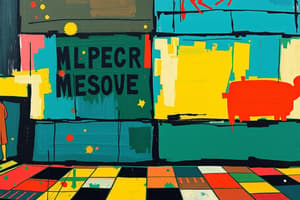Podcast
Questions and Answers
What is institutional lock-in?
What is institutional lock-in?
- The process by which institutions are created or evolve over time
- The process by which institutions provide social structure in society and incentivize individuals who abide by this structure
- The process by which institutions dominate the market, even when they are not the most efficient of the ones available (correct)
- The process by which institutions are shaped by their social and political environments and how they evolve
What is the relationship between formal and informal institutions?
What is the relationship between formal and informal institutions?
- Informal institutions step in to prop up inefficient institutions.
- The relationship between formal and informal institutions is often closely aligned (correct)
- Informal institutions are critical determinants of economic performance and have profound effects on the costs of exchange and production.
- Formal institutions tend to have socially shared rules, which are unwritten and yet are often known by all inhabitants of a certain country.
What is path dependence?
What is path dependence?
- The process by which institutions are shaped by their social and political environments and how they evolve
- The process by which institutions are created or evolve over time
- The tendency for institutions to continue along a particular path, making it difficult to return to the initial point where a choice was made (correct)
- The process by which institutions provide social structure in society and incentivize individuals who abide by this structure
Flashcards are hidden until you start studying
Study Notes
- Institutions are humanly devised structures of rules and norms that shape and constrain individual behavior.
- Laws, rules, social conventions, and norms are all examples of institutions.
- Institutions vary in their level of formality and informality.
- Institutions are a principal object of study in social sciences such as political science, anthropology, economics, and sociology.
- Institutions are critical determinants of economic performance and have profound effects on the costs of exchange and production.
- Institutional lock-in is the process by which institutions dominate the market, even when they are not the most efficient of the ones available.
- Informal institutions tend to have socially shared rules, which are unwritten and yet are often known by all inhabitants of a certain country.
- The relationship between formal and informal institutions is often closely aligned, and informal institutions step in to prop up inefficient institutions.
- Institutions are social constructions, artifacts of a particular time, culture, and society, produced by collective human choice, though not directly by individual intention.
- Sociology traditionally analyzed social institutions in terms of interlocking social roles and expectations.
- Institutions are a foundational question for social sciences
- Institutions can be seen as arising from or conforming to human nature, or in need of redesign
- Game theory is used to study institutions from two perspectives: survival and evolution, and effect on behavior
- Political scientists study the causes and consequences of formal institutional design
- Recent scholars focus on institutional strength and de facto institutions
- History sees eras or periods as major changes in the system of institutions
- Scholars propose different approaches to the emergence of institutions: spontaneous emergence, evolution, and social contracts
- Institutions may be created or evolve over time
- Actors within a society play a role in institutional change and emergence
- Institutions can emerge spontaneously without intent or through social contracts or rational purposeful design
- Institutional theory examines how organizations are shaped by their social and political environments and how they evolve.
- Institutional change can be driven by coercive, mimetic, or normative processes.
- Institutional change is endogenous and rooted in the distribution of resources and preexisting political institutions.
- Institutional change can be shaped by a lock-in symbiotic relationship between institutions and organizations.
- Weakly enforced institutions can create lasting ripples in a society and their way of functioning.
- Developing countries may establish superficial forms of Western government with malfunctioning institutions to appease international demands.
- Johannes Gerschewski and Erik Voeten created typologies of institutional change and design, respectively.
- Institutions work to provide social structure in society and incentivize individuals who abide by this structure.
- Path dependence and small differences can cause institutions to change over a long period of time.
- Institutional strength relies on legitimacy, political power, and independence.
- Institutions are persistent and endure over time, with paths determined at critical junctures.
- Path dependence leads to a narrowing of possible future outcomes, making it difficult to return to the initial point where a choice was made.
- Ian Lustick suggests that institutions can benefit from applying the concept of natural selection to the study of how institutions change over time.
- Lustick argues that the tendency to get stuck on local maxima can explain why certain types of institutions may continue to have policies that are harmful to its members or to the institution itself.
- The term "institutionalization" is widely used in social theory to refer to the process of embedding something within an organization, social system, or society as a whole.
- Institutionalization may carry negative connotations regarding the treatment of vulnerable human beings by inflexible systems of social, medical, or legal controls.
- The term "institutionalization" may also be used in a political sense to apply to the creation or organization of governmental institutions or particular bodies responsible for overseeing or implementing policy.
- Institutions are important for policymakers and people of higher levels within an institution to consider when looking at products that have a long term impact on markets and economic developments and stability.
- Change that is brought about is often in the interests of existing organizations due to the preexisting influence that they have over the existing framework.
- Institutions can change course when external forces weaken the power of an existing organization, allowing other entrepreneurs to affect change in the institutional framework.
Studying That Suits You
Use AI to generate personalized quizzes and flashcards to suit your learning preferences.




